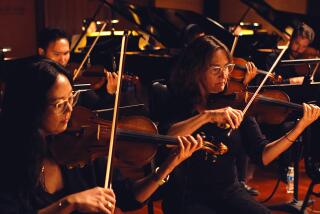HE ADDS SOUND OF MUSIC TO SILENT ‘CASANOVA’
- Share via
First “Napoleon”; now “Casanova.”
The second of two ambitious restorations of French cinema, Alexander Volkoff’s 1927 silent “Casanova” will have its American premiere Wednesday and Thursday at Royce Hall--and accompanying the film will be a specially commissioned score by Oscar-winner Georges Delerue, who will conduct a live 15-piece orchestra.
“Robert Maniquis, who was in charge at Cinema Francaise, asked me if I could use some existing music I had written--but I soon learned that wouldn’t work for raisons legales ,” the prolific composer said with a grin.
“More crucial was the artistic factor. Each film has its own personality.
“So, I suggested I write an original score for the film--but at that time, last fall, I didn’t realize the film was two hours and 15 minutes long! I had given my word, however, and I’m glad I did--it was a challenge extraordinaire .”
This challenge aside, Delerue is hardly noted for the ordinaire . The composer of about 200 film scores (“Jules et Jim,” “A Man for All Seasons,” “A Little Romance,” “Agnes of God”), at least 200 television scores, several ballets, a symphony and numerous other concert works, Delerue is among the world’s foremost musical dramatists.
A frequent Delerue hallmark in any medium is lyrical delicacy, an impressionistic use of strings, harp and woodwinds that often borders on the mystical.
“I don’t define myself as religious, but even before I composed for film, many people told me there was a very mystical quality to much of my music. I cannot really find that in myself, but it may be my conception of what music is--or a side of my personality I don’t know about.”
But “Casanova,” he explains, will have little of that.
“The film is very playful and lighthearted, and my music is often a pastiche. For example, during a chase, I parody a Western. For the scenes in Russia, I write in the Russian style. Italy, a la Italienne . It is sometimes very stereotype , but that is the film’s style.”
It was after his scoring of Ulu Grosbard’s “True Confessions” in 1981 that Delerue decided to make Los Angeles his home (he spends his summers in France). While both French and American film industries offer the same artistic freedom, “in France, producers and directors tend not to have the deepest interest in music’s role, and music is often not taken into account on the budget.”
Yet, there have been memorable exceptions. Truffaut, with whom Delerue worked on 11 films, “was very interested and knowledgeable about music. He was both anxious and happy when the music was done--it was usually the final touch on his films. When he was in the recording studio he’d say, ‘OK--now I am on vacation!”
Unlike many composers in film, Delerue insists on writing his own orchestrations. “The instrumentation varies tremendously with every film, although I do have a predilection for some instruments: I love the velvety quality of strings.”
On “Casanova,” however, Delerue realized that with two hours and 15 minutes of music needed in 2 1/2 months, an assistant would be needed.
“Richard Stone--a very good composer and my music editor--worked under my supervision, and my instructions were very, very precise,” Delerue said.
Unlike many of his film contemporaries, Delerue doesn’t consider himself above creating scores for American television. Among his most recent work for the small screen is the Kirk Douglas telefeature “Amos” and an “Amazing Stories” episode, “Dorothy and Ben” (to air in February).
“When I first came to California I was warned not to do music for television,” he said. “I really don’t understand why. Some TV movies are better than features, and I’ve been able to write the music I wanted to write. I’m just careful about what I do.”
After “Casanova,” is the release of Delerue’s latest film, Oliver Stone’s “Salvador” ( “ that’s got a lot of brass,” he laughed) and a lighthearted comedy by Costa-Gavras called “Conseil de Famille.”
There is at least one musical break in Delerue’s future. “Yes, ‘Casanova’ is in two parts,” he acknowledged with another chuckle. “There is an intermission, please God!”
More to Read
Only good movies
Get the Indie Focus newsletter, Mark Olsen's weekly guide to the world of cinema.
You may occasionally receive promotional content from the Los Angeles Times.










